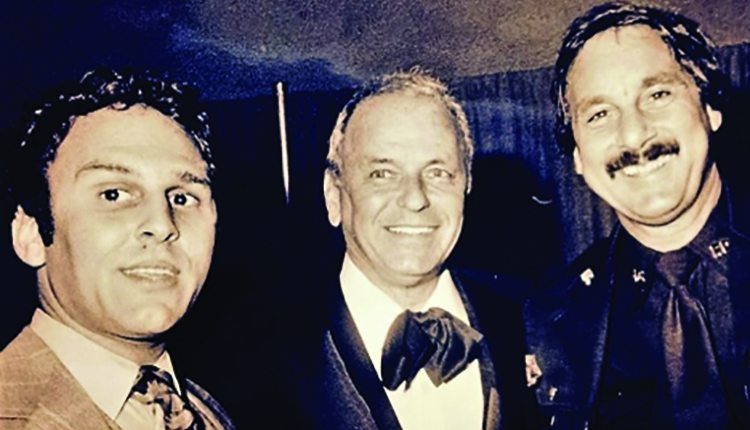
Above: Frank Sinatra and his “boys” Merrill Kelem and Bob Palamaro
“I would like to be remembered as a man who had a wonderful time living life, a man who had good friends, fine family – and I don’t think I could ask for anything more than that, actually.” – Frank Sinatra
Sinatra. An iconic surname synonymous with legend. Through his distinctly smooth voice and his larger than life persona—Francis Albert Sinatra continues to intrigue and entertain us even though he has been gone for almost 20 years. From tell-all books to TV interviews, people eagerly share their real or embellished experiences about Sinatra.
Some do so to make a quick buck, and some who loved him dearly, want to preserve the Sinatra mystique. Others, like Bob Palamaro and Merrill Kelem have 18 years of intimate stories about Sinatra’s life, work, loves, friends, and habits that have not been told—and, most of those will never be told. Who are they and how did they get these stories? Well, that is a story in and of itself. So, ask Alexa to play Sinatra tunes as a backdrop, sit back and relax, maybe with a Jack Daniels (his favorite), and hear the tale of two men who had Sinatra’s back—night and day for almost two decades.
Strangers in the Night
Atlantic City, born and raised, Bob Palamaro had been an ACPD motorcycle cop for 14 years before landing the Sinatra detail. As the son-in-law of Skinny D’Amato, renowned 500 Club owner and close friend of the Rat Pack—Sinatra, Bishop, Martin, Davis, and others, Palamaro had met Sinatra several times. Once gambling became a reality for Atlantic City, Sinatra requested a security detail from Atlantic City since he would be performing regularly at casino showrooms. D’Amato and Sinatra asked Palamaro if he was interested. He was, and once cleared with his police chief, it was a go. Palamaro recalls “…being thrilled for being asked to work with a legend.”
Kelem, a hybrid South Philly/Overbrook Park boy who transplanted himself to Atlantic City in the early 1970s, served on the AC police force for 32 years until retiring in 2005. He recalls the life-changing phone call from a Sinatra staffer, Kelem’s childhood friend, asking if he wanted to work that detail. “I was on cloud nine. Only 26 years old and hand-picked by Frank Sinatra. What an honor. I remember when I got the call—it was the night the gambling referendum passed in NJ in 1977. That started my times working with the Sinatra family—hundreds of memories and stories to tell—and some to keep to myself.”
At first, it was a typical VIP detail tending to security-related tasks ranging from escorting Sinatra to and from the stage and restaurants, dealing with State Police, logistics getting to/from airports, and even carrying Mrs. S’s jewelry—a task that only Palamaro was entrusted to do.
Initially, Palamaro and Kelem and were told by D’Amato not to approach Sinatra—“let him come to you….” After a bit of time, Sinatra became comfortable with “his boys” and started asking for more personal requests like walking with him on the Boardwalk, “shooting the s–t,” and even fetching him a Pepper & Egg sub from White House Subs—one of his favorites in Atlantic City.
Somewhere along the line, the security detail transformed into being more like a family gathering. And what do families do? Eat and kibitz, and for 18 years Palamaro and Kelem did both of those in spades! Sinatra loved to eat. Palamaro and Kelem learned what the “Old Man” liked and would prepare a spread for him—like Italian twist bread from Rando’s Bakery in Atlantic City and cold cuts from Maglio’s in Philly—he loved those cold cuts. On occasions, Mrs. Sinatra would make a batch of her lentil soup or chili—it was family style eating and camaraderie. Other times, Kelem’s mother, who ran a kosher catering service in Philly, would send her matzo ball soup. Old Blue Eyes never passed up a bowl of good—really good—matzo ball soup!
Through a bond forged from trust and loyalty, and food, of course, the families grew closer. On one occasion, Nancy Sinatra observed Kelem carving a piece of fruit. She told him he ought to be a mohel (the man who performs circumcisions on Jewish baby boys). Thus, his nickname was born—Mohel! Kelem also fondly recalls seeing Sinatra and Kelem senior sitting backstage one night shaking their heads about their respective perpetually-on-the-prowl bachelor sons lamenting, “What are we gonna do with these two?”
Someone to Watch Over Me
Sinatra knew “his boys” had his back. Yes, they were paid to do so, but Palamaro and Kelem soon realized that this job allowed them to see sides of Sinatra that most people never would or could. They also discovered that Francis Albert had a heart of gold.
Palamaro recalls that Sinatra would read the paper front to back, e very day—no exceptions. One Mother’s Day, he read about a woman who was robbed and beaten in Atlantic City. Palamaro remembers what Sinatra told him to do, “He gave me a large amount of cash and told us to drop it off to the woman at the hospital, but to make sure it was anonymous. The story hit the news anyway because local ABC news woman, Cathy Gandolfo saw us, and put two and two together. But that’s just how the ‘Old Man’ was—always looking out for others.”
In addition to helping strangers, Sinatra fiercely took care of his pack, his clan, his “family.” When Kelem developed cardiac-related issues in the 1980s, Sinatra immediately picked up the phone and called his friend, Dr. Debakey of Baylor University, to get Kelem an appointment. Then he arranged to fly him to Texas on his private jet. When Kelem remarked about being sent to the then expert in the field Sinatra retorted, “What the f—k, you think I’m gonna send my boy to a butcher?”

Palamaro and Kelem reminiscing
That’s Life
Boys will be boys, and in Sinatra’s case he and his boys were always in mischief mode. The boys included comics like George Burns, Don Rickles, and Jerry Lewis to other performers like Dean Martin, Sammy Davis, and Gregory Peck. Sinatra also rubbed elbows with sports figures like Tommy LaSorda and politicians including the Reagans—Palamaro and/or Kelem usually at Sinatra’s side.
So, what do you get when you have a bunch of “boys’ who never grew up and connections like Sinatra? One can only imagine the shenanigans that Palamaro and Kelem observed (or orchestrated) during their time with Sinatra.
For example, one day Sinatra issued a “request” to Palamaro and Kelem to “Get Bullet Head [AKA Don Rickles] and bring him to me on stage tonight.” The boys started scrambling and called Rickles who was flattered, but explained that he was performing on stage at another casino. Kelem told Rickles that the Old Man will kill him if he doesn’t fetch him. The comic eventually relented, deciding to cut his act a little shorter so he could be police-escorted across town to see Sinatra and to quote Rickles, “…so that two Jews don’t end up dead tonight.”
Sinatra, onstage and in the middle of “LA is My Lady,” caught a glimpse of Rickles backstage, stopped singing, and yelled, “Push that son of a bitch out here.” His boys did! They thrilled the audience and kibitzed on stage, finished the show, and then pulled an all-nighter in Elaine’s Lounge (Golden Nugget) “ball breaking” with pals like Red Buttons, Morty Storm, and more “boys” until their 7:00 am breakfast.
It Was a Very Good Year
Today, Palamaro and Kelem remain good friends and appreciate the Sinatra bond that they share. Palamaro brings an attaché case full of photos of themselves with Lou Rawls, Rat Pack members, and Sinatra. They sit and reminisce, photo by photo, and laugh about their 1970s sideburns and full heads of hair.

Burt Lancaster, Palamaro, Sinatra and Kelem
Palamaro, still dapper and handsome, looks back at his time with the legend and realizes now more than ever how lucky he was to be part of that world. Kelem, who never lost that dash of mischief in his eyes, looks at the now yellowing photos noting that sadly he and Palamaro are in many cases the only ones still living.
They banter back and forth as to what year the photo was taken or in which casino, but the memories and experiences are priceless—funny ones like when they put a bushel of crab shells in the room of one of the other “boys” working for Sinatra and turned up the heat. Palamaro and Kelem laugh heartily – even 38 years later.
Then they recall the night Sinatra “lost” the keys to his room—twice—so he could interrupt Kelem and a lady friend. She apparently was mortified when the legend, in slippers and a bathrobe, barged into Kelem’s room, waved, and taunted, “Yoo-hoo, how are ya darling!” And, sad memories like the last time they saw the ailing Sinatra’s ice-blue eyes light up when he said, “My boys are here…”
There are so many Sinatra stories, but don’t look for the book. Palamaro and Kelem will share a story or two if they like you; maybe three if they really trust you. But most of the memories will stay with them—and only with them.
Kelem leans back on the couch, smiles, and sums it up, “We had a front row seat—no regrets.”

